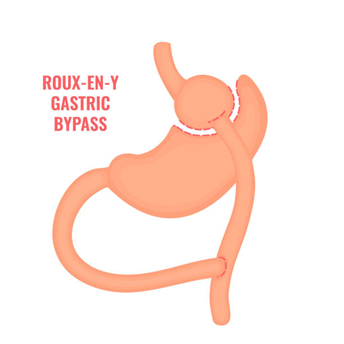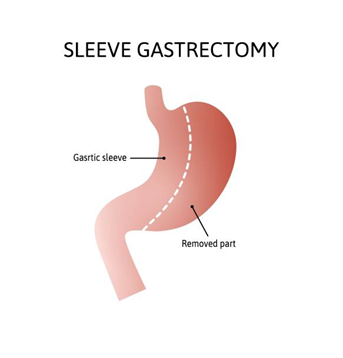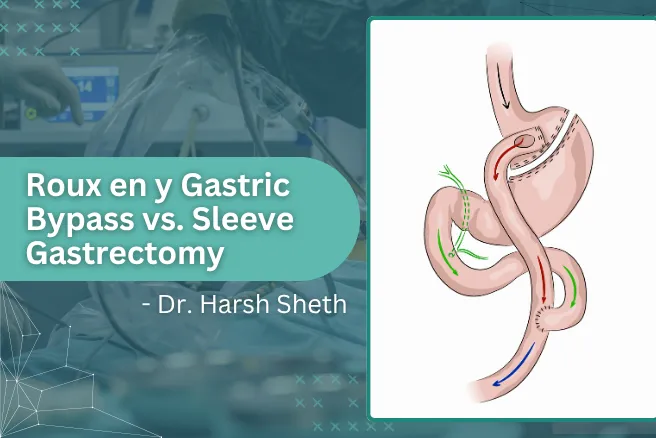When considering bariatric surgery, two procedures often dominate the conversation: Roux-en-Y Gastric Bypass and Sleeve Gastrectomy. Both are highly effective in promoting weight loss and managing obesity-related conditions, but they differ significantly in how they work and their long-term outcomes.
Dr. Harsh Sheth, a leading bariatric and GI laparoscopic surgeon in Mumbai with over 10 years of experience, offers deep insights into these procedures. With a focus on minimally invasive techniques and patient safety, he helps individuals make informed choices tailored to their health goals.
“Every bariatric procedure has its benefits and challenges. Understanding those nuances is necessary for achieving lasting weight loss and health improvements,” says Dr. Harsh Sheth.
How Does Roux-en-Y Gastric Bypass Differ from Sleeve Gastrectomy in Terms of Procedure?
Roux-en-Y Gastric Bypass:

- In this surgery, a small pouch is created from the stomach and connected directly to the small intestine, bypassing most of the stomach and part of the small intestine.
- This results in both restriction (smaller stomach) and malabsorption (reduced nutrient absorption).
Sleeve Gastrectomy:

- About 75-80% of the stomach is removed, creating a sleeve or tube-like structure.
- It restricts the amount of food intake and also affects hunger-regulating hormones.
“While both surgeries reduce stomach capacity, gastric bypass also changes how your body absorbs nutrients, which can lead to faster weight loss but also requires stricter follow-up,” explains Dr. Sheth.
Which Surgery Results in Greater Long-Term Weight Loss?

Numerous studies have shown that:
- Roux-en-Y Gastric Bypass generally leads to greater and more sustained weight loss, especially in patients with higher BMI or severe obesity-related conditions like Type 2 diabetes.
- Sleeve Gastrectomy, while also effective, may show a slightly lower average weight loss over time.
Weight loss expectations:
Bypass: 60–80% excess weight loss within 1–2 years.
Sleeve: 50–70% excess weight loss in the same period.
Dr. Sheth notes, “For individuals with severe metabolic issues, gastric bypass often provides a stronger therapeutic benefit.”
What Are the Potential Risks and Complications of Bypass vs. Sleeve?
Roux-en-Y Gastric Bypass Risks:

- Dumping syndrome: Rapid emptying of stomach contents into the small intestine causing nausea, cramps, and diarrhea.
- Nutrient deficiencies (iron, calcium, B12): Reduced absorption can lead to long-term vitamin and mineral shortages.
- Internal hernias: Loops of intestine can twist or get trapped due to altered anatomy.
- Bowel obstruction: Narrowed or twisted intestines may block food passage and require surgery.
- Ulcers: Sores may form at the surgical connections, especially with smoking or NSAID use.
Sleeve Gastrectomy Risks:

- Staple line leaks: Leaks along the stomach staple line can cause serious infections and need urgent care.
- Acid reflux or GERD: Removing most of the stomach can increase stomach acid and worsen reflux.
- Stricture formation: Narrowing at the stomach sleeve can hinder food passage, causing vomiting and discomfort.
- Nutrient deficiencies (less severe than bypass): Some nutrients may still be poorly absorbed, requiring supplements.
“Both procedures are safe when performed by an experienced surgeon, but gastric bypass does come with a slightly higher complication profile due to its complexity,” says Dr. Sheth.
How Do Dietary and Lifestyle Changes Compare Between the Two Procedures?

After Roux-en-Y Gastric Bypass:
- Strict vitamin and mineral supplementation is essential for life.
- Diet must be high in protein and low in sugar/fat to avoid dumping syndrome.
- Smaller, more frequent meals are required.
After Sleeve Gastrectomy:
- Also requires dietary adjustments and vitamin supplements, though usually less stringent.
- Patients can often tolerate a wider variety of foods.
- GERD may require ongoing management.
Dr. Sheth advises, “Surgery is only a tool—permanent lifestyle changes, including diet and exercise, are necessary in maintaining weight loss.”
Wrapping Up
Choosing between Roux-en-Y Gastric Bypass and Sleeve Gastrectomy isn’t just about the amount of weight you want to lose. It involves evaluating your current health, goals, potential risks, and how willing you are to adapt to long-term changes.
Dr. Harsh Sheth, an expert laparoscopic and bariatric surgeon in Mumbai, offers in-depth evaluations and personalized guidance to help patients choose the most suitable path. With a focus on safety, evidence-based care, and compassionate support, he ensures that patients are not just losing weight, but gaining a healthier, more fulfilling life.

